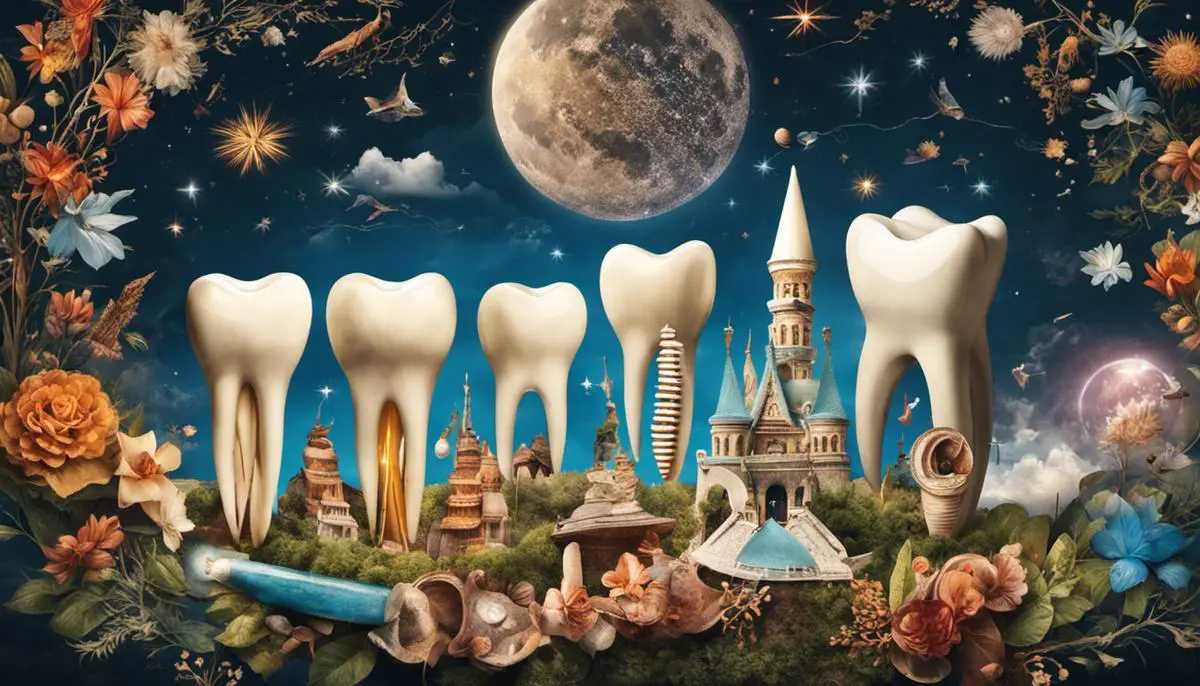The intricate world of dreams has been a subject of human fascination for centuries. With psychological theories and cultural beliefs interweaving a complex tapestry of interpretations, dreams offer a unique window into our subconscious mind. This essay delves into one noteworthy dream motif – losing teeth. By delving into the psychological understanding of why humans dream and how the unconscious mind influences these dreams, we aim to shed light on the subtle nuances that losing teeth in a dream may signify. Moreover, the essay traverses across different cultures to put into perspective how global interpretations of such dreams vary and what folklore, religious significance, or traditional beliefs attribute to this phenomenon. It also takes a delve into possible psychological implications, thereby providing a comprehensive understanding of the topic.
The psychology behind dreams
Unraveling the Enigma: Shedding Light on the Psychology of Dental Dreams
Dreams, beautiful figments of nightly slumbers, remain shrouded in an air of mystery. Among the many phenomena that unfold beneath mere eyelids, dreaming about tooth loss or dental disaster has stood the test of time as an impressively commonplace experience. The question of why such scenarios recur in our dreams has tickled the curious minds of scholars, researchers, and sleep-enthusiasts, compelling them to delve deep into the rich tapestry of human psychology.
Sigmund Freud, an eminent personality in psychology, defined dreams as the “royal road” to our subconscious. Rooted in this philosophy, his interpretation of tooth loss dreams persists as a classic in the dream-interpretation realm. Freud postulated that such dreams reflect anxiety about sexual repression or fear of castration, tuned to his famous psychoanalytic theory. Notably, this psychosexual perspective might resonate with some, but admittedly, isn’t accepted universally.
As psychology evolved, newer perspectives on dream analysis emerged. Hall and Van de Castle’s cognitive theory propose that our subconscious mind is a theatre, reflecting daily life concerns and emotions through absorbing dream content. Therefore, dreams about tooth loss could be symbolic representations of personal losses, transitions, or significant life changes. People dreaming about tooth loss could be actually grappling with fear of change, personal loss, or aging, manifesting in this unusual dental symbolism.
Further advancement yields to Carl Jung’s archetypal hypothesis—another fascinating angle to perceive tooth loss dreams. Jung believed dreams are messages from our psyche, encoded in a language of symbols and archetypes. In his view, teeth, being an integral part of our survival toolkit, can symbolize strength and power. Consequently, dreams about losing teeth might hint towards feelings of weakness, loss of control, or even self-esteem issues in waking life.
In a more recent, circumspect perspective, the Threat Simulation Theory proposed by Antti Revonsuo in 2000 provides a plausible explanation as well. This evolutionary approach suggests dreaming primarily serves a biological survival function—simulating threatening events to enhance real-life threat perception and avoidance. Potentially, dreaming about tooth loss could reflect our inherent fear of vulnerability or harm.
Bridging the gap between individualistic and collective approaches, Cultural Psychology also adds a valuable dimension. Cultural specifics significantly influence dream interpretation, across numerous societies, teeth symbolize vitality and vigor. Hence, from a socio-cultural viewpoint, dental dreams might be gnawed by fears of losing health or vitality.
The arena of dream research illustrates a beautiful convergence of science and art, and thus, resists a single-strict interpretation. Decoding the mystery of dreams involves acknowledging our mind’s dynamic nature and the rich interplay of psychological theories that endeavor to trace the nebulous pathways of our psyche. Indeed, our dreams, even seemingly distressing ones about losing teeth, could be our subconscious mind’s way of communicating, coping, or merely, introspecting. Such is the labyrinthine nature of dreams—each thread unravels an insight, yet leaves so much to explore. Dreams of losing teeth thus become a riveting portal into the human mind’s profundity, translating the abstract into tangible, one dream at a time.

Cultural perspectives of losing teeth in dreams
Article: Cultural Perceptions of Tooth Loss in Dreams: A Spectrum of Symbolism
Delving into the abyss of recurrent human experiences, tooth loss in dreams occupies a significant place in the annals of dream interpretation. To comprehend the varied cultural perceptions of this phenomenon, one must first accede to the multifaceted nature of symbolism. Every object, event, or presence in our dreams carries a subjective insinuation influenced by societal, cultural, and personal paradigms.
While pre-existing hypotheses and theories have provided in-depth explanations around tooth loss in dreams, a critical discernment of diverse cultural interpretations extends the discussion beyond intra-personal psychological dynamics.
Turning our attention to African cultures, we notice Zulu interpretations where dreaming of tooth loss tends to denote the death of a relative or close acquaintance. This interpretation, underscored heavily by communal ties and profound ancestral respect, provides testimony to the tight-knit familial structures prevalent in Zulu society.
In contrast, in China and other parts of East Asia, dreaming of a tooth or teeth loss is often seen as an omen, signaling the future loss of dignity or face. Considering societal structures that place significant emphasis on maintaining social harmony and personal honor, this interpretation resonates strongly with local cultural assumptions.
In terms of the Western cultural canvas, the perception of tooth loss in dreams has varied implications often linked to anxiety around aging or deteriorating physical health. This mirrors the emphasis on youth, aesthetic beauty, and physical health within Western culture, subtly embracing Freud’s psychoanalytic reflections with a societal mirror.
Delving into the Islamic world, we encounter belief structures emphasizing dreams as divine revelations or premonitions. In this context, losing teeth, particularly the front ones, could suggest loss of wealth or anticipated hardships, an interpretation echoing across the Middle Eastern traditions.
Suffice it to say, the symbolism of tooth loss in dreams circumambulates a spectrum of cultural societies and carries distinct flavors that resonate with the multi-dimensional human experience. These interpretations, viewed through different cultural lenses, magnify not just the subjective nature of dream interpretation but also underscore the vital role of societal and cultural influences in shaping our subconscious realm.
While these perceptions can inform our exploration of tooth-loss symbolism, one should remember that they represent collective cultural ideas rather than individual interpretations. Human experiences remain intricate, individualistic, and cannot be reverted to a singular meaning or encapsulated within a precise cultural collective.
Therefore, interpretations should be considered tentative and flexible, responsive to the individual’s emotional terrain, societal inputs, cultural backdrop, and life experiences. This circumlocution subdues the misguided notion that there exists a concrete, universally accepted meaning to dream symbols, instead, highlighting the subjective nature of dream interpretation and the cultural canvas against which these dreams are painted.

Potential psychological implications
Formulating a comprehensive understanding of dreams and their psychological implications calls for a resonant discourse that amalgamates not only conventional Western psychoanalytical perspectives, but also an integration of global cultural paradigms pertaining to dream interpretation; a rewarding task, albeit a labyrinthine one.
Delving into the psychological domain and traversing that vast landscape gives rise to numerous intriguing conduits worth exploring. One such wending path leads towards insights gained from psychoanalytic deductions relating to Anxiety and Stress Disorders. Psychoanalysts propose that dreams, such as those about tooth loss, could be expressions of the mind grappling with anxiety or a lingering sense of powerlessness. These dynamically poignant elements are invariably woven into the fabric of the dreamer’s life, their concerns about body image, self-esteem, and social acceptance.
Even as we appreciate the skilful intricacies of psychoanalysis, Behaviorist theories warrant equal acknowledgement. Dreams, to behaviorism, are not profound conduits of insight into the psyche’s labyrinth, but upshots from the brain processing information. In the context of tooth loss dreams, behaviorists might conjecture these nocturnal narratives to emerge from dental discomfort, dietary changes, or merely the brain’s response to sensory input during the rapid eye movement (REM) sleep phase.
Meanwhile, adopting a cognitive perspective introduces another dimension to dream interpretation. Distinct from Freudian notions of concealed desires or Jungian archetypes, cognitive psychologists deem dreams as the mind’s methodologies for problem-solving and memory consolidation. Tooth loss dreams, under this light, reflect the individual’s mental processing of life changes, losses, transitions, or even unprocessed grief.
An esoteric perspective shimmering amid modern dream discourse is the Supernatural paradigm. Rooted in ancient spiritual traditions, supernatural explanations purport dreams to form part of a cosmic communication system. Tooth loss experienced in dreams can be related to the foretelling of future life events, prophetic warnings, or divine instructions, far removed from earthly pragmatism.
Beyond these well-established theories, recent research is unleashing promising discourse on neuroscientific interpretations, evoking the interplay of brain structures like the amygdala, hippocampus and the prefrontal cortex in dream generation. With specific relevance to tooth-loss dreams, neuroscientists postulate they may be correlated to the brain’s struggle with emotional regulation, fruitful terrain for future investigations.
Moreover, given the multifaceted nature of humanity itself, uncovering the symbolism in dreams necessitates considering the sociocultural context. Community wisdom, local legends, familial beliefs, and religious dictates—as seen in Chinese, Islamic, African and many other cultures—shape dream interpretation. They layer on meanings, making the psychological implications of dreams intricately woven tapestries of personal and cultural narratives.
Conclusively, dreams are as varied and individual as the dreamers themselves. Their interpretations, though subjected to certain theoretical constructs, remain a deeply personal exploration. The interdisciplinary nature of dream studies offers a transcultural, enriching dialogue that keeps us enthralled as we delve ever further into the inviting murkiness of the human mind, pioneering paths of unending fascination.

After an enlightening journey through the intriguing labyrinth of dreams, it’s clear that losing teeth in dreams can imply a multitude of interpretations, predominantly dependent on personal psychological contexts and cultural backgrounds. It’s fascinating how different cultures provide a diverse range of interpretations, enriched by local folklore, religious beliefs, and traditional narratives. Furthermore, its psychological implications emphasize the close relationship between our dreams and our mental or emotional state. The dream of losing teeth, though seemingly alarming, often serves as an important signpost – alerting us to pay attention to our mental health or prepare ourselves for life transformations. Embracing these insights not only appeases potential anxieties but also equips us with the wisdom to view such dreams as tools for self-awareness and personal growth.
